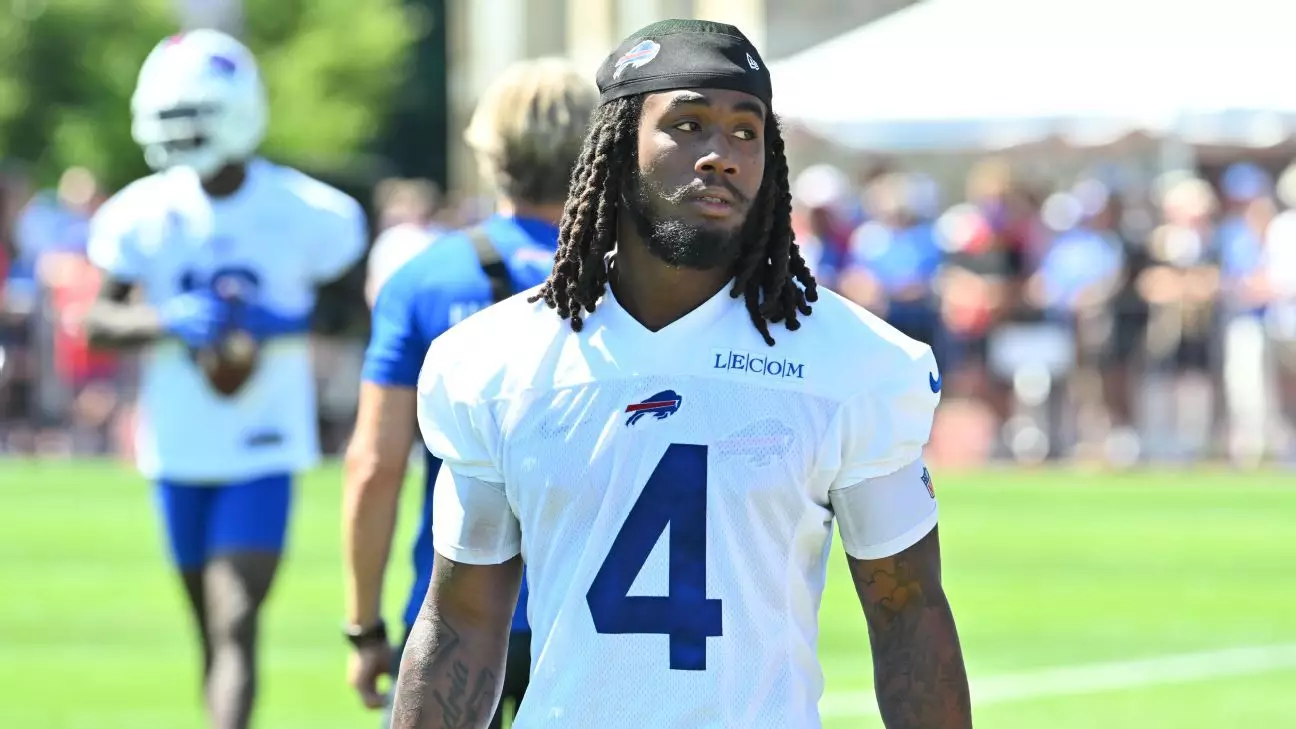In the high-stakes world of professional sports, players often find themselves caught between maximizing their worth and maintaining team harmony. James Cook’s recent comments reflect a fierce determination to secure a lucrative contract—a pursuit that transcends monetary gain, speaking to his confidence and belief in his own value. Cook’s assertion that he “deserves what I want” underscores a mindset that refuses to accept undervaluation, setting a tone that challenges traditional perceptions of player negotiations. His public stance reveals not just ambition but also a deep conviction that his performance and potential warrant top-tier compensation. Such confidence can serve as a catalyst for players in similar positions, emphasizing the importance of self-advocacy in a league that often prefers placid negotiations.
The Complexity of NFL Contract Dynamics
Contract talks in the NFL are rarely straightforward. While Cook remains optimistic, his case exposes the intricate balance teams must strike—assessing cap implications, team chemistry, and long-term strategy. Buffalo’s GM Brandon Beane’s comments reveal an organization that values its homegrown talent but also has fiscal boundaries. The fact that Cook’s desired salary aligns him with top-tier running backs demonstrates how the market is evolving to recognize the importance of a dynamic running game in modern offenses. Yet, the reality remains that teams must weigh individual player requests against collective goals. Cook’s statement about negotiations “sometimes not fitting in” hints at the delicate dance involved, where patience and strategic planning are essential. This underscores a broader truth: player loyalty and team financial health are often at odds, requiring a careful negotiation that can either lead to fruitful collaboration or disappointing stalemate.
The Culture of Loyalty and Its Limitations
Cook’s unwavering desire to stay with Buffalo showcases a rare trait in today’s NFL—a sense of loyalty to the franchise that drafted him. His expressed pride in the organization and its fan base highlights the emotional connection players often develop. However, loyalty in professional sports constantly confronts the harsh realities of financial fairness and career longevity. Cook’s decision to participate fully in training camp despite previous missed voluntary workouts illustrates the importance of demonstrating professionalism and dedication. While his on-field presence is motivated partly by self-interest—to avoid fines and prove himself—it also communicates a deeper message: that commitment can coexist with a desire for fair compensation. Still, teams are not solely driven by loyalty; they are strategic entities, scrutinizing every dollar spent and every roster move. Therefore, Cook’s narrative is not just about individual valuation but also encapsulates a broader tension between personal ambition and institutional constraints.
The Future of Player-Talent in a Shifting NFL Landscape
Cook’s shining performance last season, culminating in tying a franchise record, underscores his importance. Yet, in an era where offensive schemes evolve rapidly, the role of the running back is simultaneously gaining and losing value. His desire to be more involved in the passing game and third-down scenarios reveals an understanding of his multifaceted role and his need to diversify his contributions. The fact that he is the most productive among his draft class amplifies his leverage, but it also raises questions about how NFL teams value recent production versus potential. His push for a $15 million per year contract—making him just the third-highest-paid back—could reshape how the franchise and other teams evaluate running backs. His stance is a testament to a new generation of players who refuse to accept diminishing roles or undervaluation, instead asserting their worth in a hyper-competitive environment. If Cook continues on this trajectory, he may usher in a paradigm where performance, self-belief, and market value intersect more aggressively, challenging old-school norms that often undervalue positional importance.
The Implications for Broader NFL Contract Culture
Cook’s negotiations and public declarations exemplify a broader shift in the NFL’s contract culture—one rooted in player empowerment and digital-era branding. His willingness to go live on Instagram and openly state his financial goals reflects a new openness and assertiveness that players leverage to influence public opinion and possibly sway negotiations. It also signals a departure from traditional, often secretive negotiations, moving towards a more transparent and player-centric approach. This shift could catalyze a broader reevaluation of how teams and players communicate and negotiate. As players increasingly recognize their market value and are willing to publicly assert it, teams might need to adapt their strategies to manage player relations more effectively, balancing star power with team stability. Cook’s case exemplifies this evolution, suggesting that future negotiations may hinge heavily on a player’s ability to brand themselves as indispensable entities rather than mere contracts on paper.
In the end, James Cook embodies a new breed of NFL player—bold, confident, and unapologetically driven. His pursuit of fair compensation challenges teams to reconsider how they value their talent, forcing a reevaluation of loyalty, market worth, and the player’s role in shaping their destiny within the league’s intricate ecosystem.


Leave a Reply